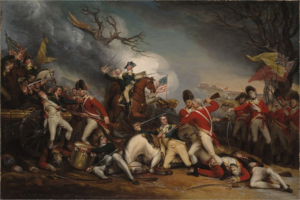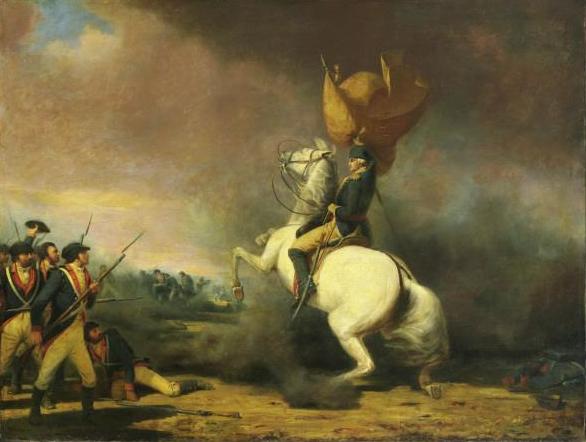The Battle of Princeton was one more gritty, brave victory for the Americans, won on sheer determination and a bit of George Washington ingenuity.
After being overtaken at Trenton, Washington had been forced to retreat across the Delaware River. He and his men were now crossing back over the river and into Trenton. The date was December 31, 1776.

General Washington and his army had scarcely been across the river for 24 hours when he received the word that 8,000 British troops, led by General Cornwallis, were on their way to attack him. While Washington lamented over the situation of having to hold off 8,000 men with his 1,500, Cornwallis wasted no time in preparing for his attack.
He broke off two sections of his army, one led by General Cadwalader and the other by General Mifflin, and sent them to attack the north and south sides of Washington’s army.
In addition to Washington’s dilemma of only having 1,500 men, he faced the problem that most of these men’s enlistments expired at 12:00 on that very night (December 31). However, he managed to convince most of his ragtag army to stay for another six weeks.
On January 2, 1777, Cornwallis’ armies arrived. The two sections were already in position: one at the north and one at the south. The primary army, consisting of 5,500 men and 28 large guns, then moved in to block the main road that led to Maidenhead.
It was pouring rain by the time the battle engaged. The British moved in from all angles, trying desperately to push the Americans back through the mud toward Trenton. The Americans fought stubbornly and would not surrender. They would not give up Princeton this easily. Soon, however, the rain came down so hard that both sides gave in to the weather and broke with the intent of resuming their quarrel in the morning.

General George Washington rallying his troops at the Battle of Princeton
Public domain image.
Washington then decided that he was not ready to submit to the suicide waiting for him and his army in the morning if they decided to stay. Therefore, in the night, the American army left campfires blazing, and headed around the sleeping British army to Princeton.
When the British in Princeton saw the American army coming across the bridge, they thought that the Hessians had turned on them and were coming to attack. Terrified, many British troops deserted the city, and those remaining split apart in worried confusion.
When they realized their mistake, they tried to position themselves in some sort of order before it was too late. Soon a firefight was raging between the two armies. The British tried hard to keep the Americans off, but the Continental Army had almost reached its goal and would not be stopped.
After a long and gruesome fight, the Americans took Princeton. Then to the dismay of Washington and his men, a British army arrived to reinforce those fleeing from Princeton.
Washington tried to rally the remaining American soldiers, but they were beaten down and discouraged. Finally, a trumpet sounded in the distance, and to their joy, American General Sullivan rode over the hill leading a large troop of reinforcements. Washington’s troops suddenly had newfound energy, and they were ready to strike again.
The British charged, but their attack was short-lived. They were held off with little effort by the Americans. In a short time, the confused British soldiers began fleeing in all directions.
Washington gathered his men and hurried to Princeton, knowing that Cornwallis, whom he had bypassed in the night, would soon be on his tail. He then marched his troops from Princeton to Morristown which was held by Americans.
When Cornwallis arrived and saw that Princeton had been overtaken by the Americans, he moved his army to New Brunswick, the only place in New Jersey held by the British at the time, for fear that the Americans would soon be back to overthrow his men as well.


